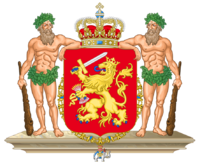Tatani
Stat of Tatani | |
|---|---|
| Anthem: National Anthem of the Stat of Tatani | |
| Status | Member State |
| Capital and largest city | Skaro |
| Official languages | Ensku (Anglish), Norðurskandi, Vestslavisk |
| Recognized languages | Sørskandinavien |
| Religion | Orthodoxy |
| Demonym(s) | Ahranaian, Tatani (Regionally) |
| Government | |
• Governor-General | Yrsa Wengodottir |
• Executive Council | See Exectuive Section |
| Legislature | Assembly of the Stat of Tatani |
| Currency | Krone (₭) |
| Time zone | Ahranaian Standard Time (AST) |
| Driving side | left |
| Calling code | +343 |
The Stat of Tatani is a Member State to the Union of the United Kingdom of Ahrana being one of the seven internal Stat's that make up the Union. Tatani has in the past been the area where all rebellions against the Government starts due to the Nationalistic nature of the local governments, however since the last war these tendencies have seem to stop.
Government
The Stat of Tatani is a Member State to the Union of Ahrana and therefore has the right, much like the other Member States of the Union, to have a Regional Constitution outlining its Government, Rights of the People, and whatever is not dictated to the Federal Government per the Federal Constitution. The Stat of Tatani is headed by a Federal Appointed Governor-General who acts as the representative of the Monarch in the Member State and holds not executive power. All Executive Power is invested in the Executive Council of Tatani which is a Seven Member Council.
Governor-General
The Governor-General of the Kingdom of Tatani is appointed by the Monarch, Federal Chancellor, State Councilor, and the State Parliament for a four-year term, this term is not capped on the length of appointment to office. The Governor-General by law cannot be affiliated to any Political Party while in Office, a Member of the Federal Government or Regional Government, besides the office of Governor-General.
The Governor-General holds no Executive Power but is purely a Ceremonial position. The authority the Governor-General holds are signing all Regional Laws into effect, heads the Regional Executive Presidium at the end of every year, opens the regional parliament on the behalf of the Monarch and the Regional Executive Council, and acts as mediator between the Federal and Regional Governments.
Executive Council
The Executive Council is a seven-member Council headed by a Council President that is rotated ever year among the Seven Members who in turn serve a Seven Year Term. The Executive Council is the sole Executive Authority in the Regional State and holds the authority to create and stop any legislation from being passed, with approval of the courts. The Council is the Regional Head of Government. the Council President is decided by who was in the Executive Council by length, meaning the most senior person in the Council is the President and is then rotated by that system.
The Executive Council is currently composed of the following members:
- Aðalgeir Olavsson (Counicl Member for Rayon)
- Arna Kristiansson (Council President, Council Member for Rayon)
- Diðrik Viktorsson (Council Member for Rayon)
- Filip Lushana (Counicl Vice-President, Council Member for Rayon)
- Jóhanna Jacobsson (Council Member for Rayon)
- Kjalvör Luav (Counicl Member for Rayon)
- Magna Shuna (Council Member for Rayon)
Legislative
The Parliament of the Stat of Tatani is a Unicameral Legislature called the National Assembly of Tatani, which is made up of 100 Members of Parliament that serve a four-year term renewable three times only. The Members of Parliament are responsible for debating the governments laws they wish to enact, regulation of taxation, healthcare laws, public education, and regional law enforcement through the Federal Police Services.
Judicial
The Judiciary of the Stat of Tatani is set up by the Federal Judiciary having three levels of courts at the Regional Level: Regional Supreme Court, Municipal Court, and City Court. Each of these three Courts are headed by a panel of three judges that are nominated by the Executive Council, veted by the Regional Parliament, and Elected by the People to a seven-year term renewable three times only.
Foreign Relations
By Constitutional Law the Federal Government oversees the International Representation of all Member States within International Organizations, but the Member States do reserve the right to have Embassies and Ambassadors in foreign nations and International Organizations to work with the Unions Ambassadors. All Ahranaian Embassies have a Federally Appointed Ambassador and an Ambassador from Each Member State within that Embassy appointed by the Regional Executive Council. Furthermore, a Regional State may create treaties with foreign nations if it does not conflict the interest of the Federal Government or National Security for the entire Union.


